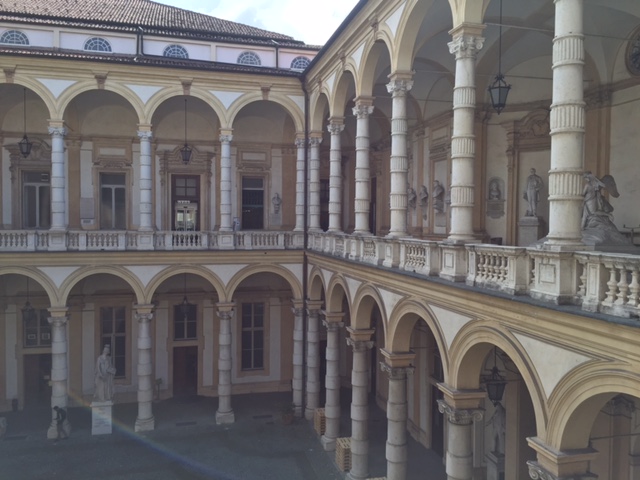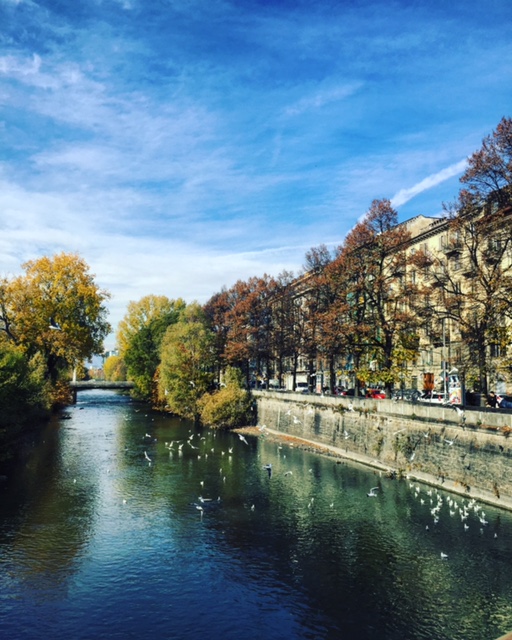Как я была студенткой Туринского университета
О своей учебе по обмену в Туринском университете рассказывает Дали Марзиева, студентка 2 курса образовательной программы «Политический анализ и публичная политика» (текст на английском языке).

Since my bachelors in International Relations when I chose to learn Italian language, I always wanted to study in Italy. When I saw an announcement that our Public Policy Department launched a partnership agreement with University of Turin, I realized that this is my shot! And now, I am sitting in the one of the best European university libraries and writing this story to tell you what is like being a student of UniTo.
Apply to exchange program
To apply for exchange program it’s necessary to write a good, comprehensive motivation letter and soon you are going to be invited to an interview with our department members so they could choose the best candidates that fit the criteria.
Apart from my personal interests and fluency in Italian language first thing to do to justify my motivation was selecting right courses at UniTo and showing how this program would benefit my thesis research. So, after investigating UniTo departments websites two nights in a row, I chose courses that were more or less equal to the ones that were going to be held at HSE and those that supposed to be useful for my thesis. Besides, since PPD has a partnership agreement with Law Department in particular, fortunately they had an ongoing research project on ICT regulation, which is the field of my research interests.
At UniTo there is a wide range of academic courses held in English and moreover, exchange students are free to take courses from any departments they want. As for me, I focused on the department of Cultures, Politics and Society and Law Department. So, to sum up, my main reasons to go on exchange program were valid selection of the courses that I was interested in and a strong justification for the thesis research.
Step 2: interview. Our PPD Professors held my interview. The questions concerned mostly my motivation letter, selected courses and possibilities for research thesis that I could gain from the program. In fact, it was quick and I received my approval on the same day. And that's where the organizational routine begins.
Organization issues
As soon as I got my department approval for exchange program I communicated with my academic coordinator at UniTo, Dottoressa Paola Gammino, which is by the way, the kindest and nicest person ever, who helped me a lot during my preparation for exchange and also during my first days in Turin. First, we agreed on the terms of my academic mobility and soon I received an invitation letter for my study visa. Then we finalized the range of my selected courses and Paola helped me with arranging my personal schedule.
Finally, together with PPD professors and UniTo side we arranged a learning agreement with all the courses that I was supposed to attend at UniTo and their equivalents in HSE.
All information concerning the documents for academic mobility is available on the UniTo website. Anyway, the most important thing is to have a student visa. I found the list of documents on website of Italian Visa Management Service (Italy-vms.ru) and got my visa issued in three days after submitting the documents.
Accommodation. I decided to apply for university dormitory in Turin through the platform of organization called EDISU Piemonte that manages the accommodation for students in Turin. I did an online application for a room in university residence two months before my departure. We agreed upon the terms of my stay with EDISU representatives and after a week of email correspondence, I received approval of my booking inquiry and invitation letter for the visa.
Academic year at UniTo starts in the end of September and so, after all the formal procedures were done I arrived in Turin on 20th of September.
Torino or Piccola Parigi (little Paris of Italy)
When I arrived to Turin I was more than amazed. Frankly speaking, I was expecting Turin to be an industrial city, since being the city where Italian automobiles company FIAT was established, it was one of the driving forces of Italian industry in the 20th century. However, it turned out to be a classy European town with baroque styled palaces, narrow streets, big squares and fountains. Also, Turin is one of the greenest and environmentally friendly cities of Italy.
My dormitory is situated in the very heart of the city, close to Mole Antonelliana, symbol of Turin and fortunately, 15 minutes on foot from the university. The majority of the students in this dormitory are Italians, in fact I share room with a lovely Italian girl.
Apart from the beauty of architecture and nature surrounding me here, what fascinate me the most are the people. I knew that Italians were famous for their hospitality and kindness but considering that I'm going to live in the continental northern part of Italy, where the citizens consider themselves more as Europeans rather than Italians, I was a bit skeptical about this stereotype. As it happens, you never know.. Though being the only exchange student from our department and going to Turin all on my own, I never felt alone or in need, because literally everybody I met here was happy to help and support!
Università degli Studi di Torino
My study at University of Torino started from the organizational meeting with all exchange students, that was held in a… former royal palace (yes, studying in fancy palaces is totally normal here). We were given some formal instructions and information on the history of UniTo.
Nevertheless, my lectures are held in other building, called Campus Luigi Einaudi, named after the Italian president, who graduated from UniTo. This is a modern building, situated on the Po River bank, equipped with all up to date technologies in every classroom.
For my study plan, I picked up 2 courses in English (EU External relations and EU as a Global Actor, or as we call it “Region Europe”) and 3 courses in Italian (Media systems and ICT, Sociology of organized crime and Migrations, Cultures and Territories). The courses are all from the different academic programs, and every professor has its own way of teaching. For example, at the course of EU External Relations (Law Department), students receive study materials before every lesson, and the professor follows the structure of these syllabuses. On the contrary, at the course of Media Systems and ICT (department of Cultures, Politics and Society), lectures are given in a more informal way or I would even say lecture looks like a little performance: our professor somehow manages to talk about serious and important matters with a humorous undertone and students love this approach (I think it's a professor’s merit that a classroom is overloaded by students during his lessons, even though the attendance is not obligatory).
The study process is a bit different from the one we have at HSE: if in Moscow we are given regularly some assignments to do, here at Torino, students are given a list of books that they are supposed to read before the exam and attend lectures. However at some courses we do group projects and presentations in the same way as in HSE. The thing I like here the most, is that almost at every course it’s envisaged to invite some guest lecturer, research fellow or some specialist working in the field. For example, at Region Europe course every lesson is given by a guest lecturer: whether he is a professor from the partner university of Bosnia or some European Commission officer.
Speaking about the students here at UniTo, the majority of them are obviously Italians but you can meet many foreign students as well, especially at the courses held in English. Besides, since the study process here is indeed flexible, at many courses held in Italian there is a possibility to pass exam in English. The most important thing is to present yourself to a professor at the beginning of your stay and Inform him that you are an exchange or Erasmus student (they feel really happy, when foreign students choose their courses :))
Of course, studying here is not easy at all: I spend almost the whole day at Campus and in the university library (which is priceless, by the way), reading books, doing presentations, preparing for my midterms. But it’s 100% worth it, because UniTo and city of Turin provide a range of great opportunities.
Opportunities
First I would like to say that I was extremely lucky to be at the right time in the right place. While my stay here in Turin, the criminology festival (yes, festival :)) was held in the city. Since I'm interested in the field of cybersecurity issues I was particularly willing to attend a conference on the cybercrime phenomenon, which I did eventually. The conference was led by Italian ICT company Produce ICT, the main speaker was an Italian “ethical hacker”. I managed to catch him in the hall after the conference and we ended up discussing trends in cybersecurity issues and phenomenon of cyber activism. I took his contacts and I am looking forward to interview him for my thesis research. To be honest I would never think that I could find someone who indeed works in the cybersecurity field every day, so there was no way I could miss this chance to enrich my final research with such experience.
Second, I'd like to say a few words about other opportunity that UniTo provided me with, which is a trip, to the heart of The European Union, Brussels, organized within the framework of the Region Europe Course. During the trip we were supposed to visit NATO, European Parliament, Belgium-Italian Chamber of Commerce, EU External Action Service and other European institutions. This was truly an invaluable experience for a political science student to actually get into the world of decision making processes, national security issues, foreign affairs at the EU level. In other words, seeing with own eyes things you’ve been studying for almost 6 years was indeed impressive.
Frankly speaking I was a little bit disappointed by our visit to NATO. I will omit the annoying part of the lecture dedicated to the typical NATO rhetoric about NATO being all fluffy and defensive, while Russia being an offensive aggressor and a major threat to the world stability (I'm not exaggerating). I was looking forward to discuss (guess what?) cybersecurity issues with the NATO officer, that gave this speech to us, but he didn't answer my questions at all, providing me with some vague, general statements. Shame on you, NATO…
Anyway generally speaking the trip was very interesting, we spent almost a whole day in the European Parliament, listening to lectures given by the MPs. We even managed to attend a Social-Democratic Party session in the end of the day.

So, to sum up, my main point is: going to exchange program to UniTo was of the best decisions I ever made, and I'm really thankful that HSE provided me with this unforgettable experience. My advice to our 1st year students: go for it! It worths every minute of studying at the edge of dawn or a penny spent. It's not only about unique academic opportunities that you could gain, but also about finding new friends from all around the world, enjoying the culture and beauty of one of the most amazing countries, and let's face it… They never have a bad weather in Torino.
Text by Dali Marzieva, HSE Public Policy Department, 2nd year master student


.jpg)
.jpg)